
Thank you for continuing to subscribe to our monthly newsletter. We hope you continue to find the content useful and we welcome any feedback or suggestions on topics that you would like to see covered in future editions of the newsletter.
FAS technical advice line: 03000 200 301
- Key dates to be aware of…
- How can we help you?
- Farming Advice Service User Survey 2025 – what you told us
- Animal Health and Welfare Pathway expanded to provide funded health assessments for multiple herds per farm.
- Defra announcement on the Spending Review 2025
- What to expect from a farm visit from the Environment Agency
- CSF - Helping farmers plan for Environment Agency Inspections
- Environment Agency issues updated irrigation forecasts
- Environment Agency guidance published on how drought is managed in England
- CSF Case Study: Practices to protect soil and water quality in Kent mixed farm
- Telfit Farm - a practical example of agroforestry in hedgerow that boosts productivity and biodiversity
- The Management of Hedgerows - Regulations 2024: One year on
- Electronic ID for Cattle mandatory in step forward for UK biosecurity
- Updates from the Defra Farming blog and industry announcements
- Stay up to date with us
Applications for the Farming Innovation Investor Partnership competition close on 2 July at 11am.
The competition opened on 2 June and is part of the Farming Innovation Programme, delivered by Defra in partnership with Innovate UK.
Information on the criteria and how to enter is available online.(GOV.UK)
Applications for the Farming Equipment and Technology Fund 2025 close on 10 July at midday.
The fund is part of the Farming Investment Fund and applications opened on 29 May.
Information on the criteria and how to apply is available online. (GOV.UK)
For more details about the information provided in the key dates table, visit the Rules for Farmers and Land Managers and the relevant pages of GOV.UK.
Key dates for annual SFI declaration submission
To assist Sustainable Farming Incentive (SFI) agreement holders, the Rural Payments Agency (RPA) have outlined the opening and closing dates for the SFI annual declaration submission based on the start date of the agreement:
| Agreement start date | Declaration period opens | Declaration period closes |
|---|---|---|
| 1 July 2024 | 1 May 2025 | 30 June 2025 |
| 1 August 2024 | 1 June 2025 | 31 July 2025 |
| 1 September 2024 | 1 July 2025 | 31 August 2025 |
| 1 October 2024 | 1 August 2025 | 30 September 2025 |
| 1 November 2024 | 1 September 2025 | 31 October 2025 |
| 1 December 2024 | 1 October 2025 | 30 November 2025 |
| 1 January 2025 | 1 November 2025 | 31 December 2025 |

Free and confidential advice
The FAS is funded by the Department for Environment, Food and Rural Affairs (Defra). We provide free, confidential advice to help farmers and land managers in England understand and meet the legal requirements in English law around certain farming activities to protect people, livestock and the environment. We update the farming sector on relevant government farming policy that is applicable in England and on the actions that can be taken to help farmers comply with the relevant regulations. Our newsletter also provides articles on topics that are complementary to farming regulation, such as practices that benefit the wider environment and wellbeing support.
Our website hosts our previous newsletters, as well as technical articles and webinars that cover various topics in more detail.
Contacting the advice line: Farmers requiring telephone advice can contact the FAS technical advice line on 03000 200 301, Monday to Friday, between 08:30 and 17:00. The Rural Services Helpline provides a single number for all FAS, Rural Payments Agency (RPA), Animal and Plant Health Agency, Natural England and Forestry enquiries.
You can also email enquiries to advice@farmingadviceservice.org.uk. Our helpline team aims to respond to all telephone and email enquiries within one working day.
Many thanks to everyone who took the time to complete the FAS User Survey for 2025.
We received more than 1200 responses from farmers, land managers, advisors and others who work in and alongside the farming industry. 85% of respondents were farmers from across a wide range of farming sectors, so we hope we have heard from a diverse range of voices in the industry.
We are pleased to see many of our new users discovering the service though last year’s promotion, including in Farmers Weekly, Farmers Guardian and on social media.
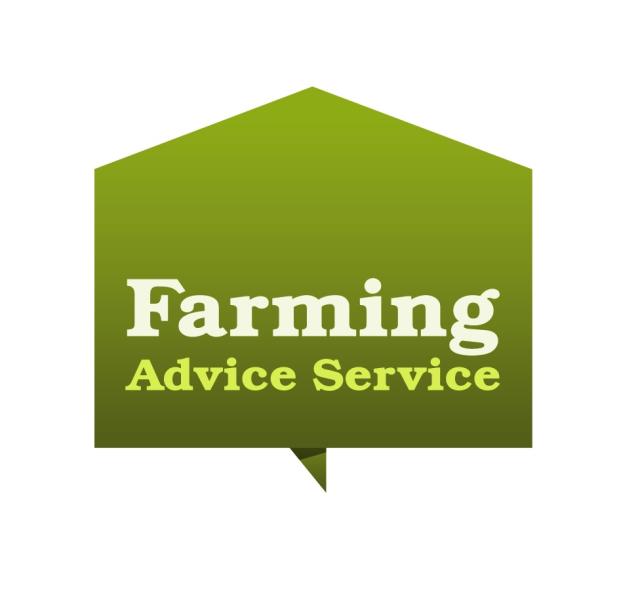
It was great to see more than 80% of respondents telling us they find the FAS Newsletter and Key Dates useful, and we have noted some helpful feedback and suggestions, including topics you would like to see (e.g. APHA guidance, information for small holdings), making information more concise where possible and further information on available grants and how to apply.
Some users were not aware of our new look website and partnership with Catchment Sensitive Farming (CSF), with new resources and events, so if you haven’t already please do explore the FAS and CSF webpages.
We would also like to remind everyone that FAS have a helpline service, via both phone and email: 03000 200301 or advice@farmingadviceservice.org.uk. If you have any questions or need advice, we are here to help. We also welcome suggestions on things you would like us to include within the FAS service, whether this be in the newsletter, webinar topics or technical articles.
The expansion of the Animal Health and Welfare Pathway provides farmers a more comprehensive understanding of livestock health on farms with groups of animals, whether mixed holdings or larger farms with groups of a single species.
From 26th June, livestock farmers can now access funded vet visits for multiple herds or flocks belonging to the same farming business, helping to support better health and profitability within the sector.
Visits will be available to support monitoring and treatment of diseases, including Bovine Viral Diarrhoea (BVD) in cattle, Porcine Reproductive and Respiratory Syndrome (PRRS) in pigs, and worming resistance in sheep.
Applications take just 90 seconds and can be completed at here.
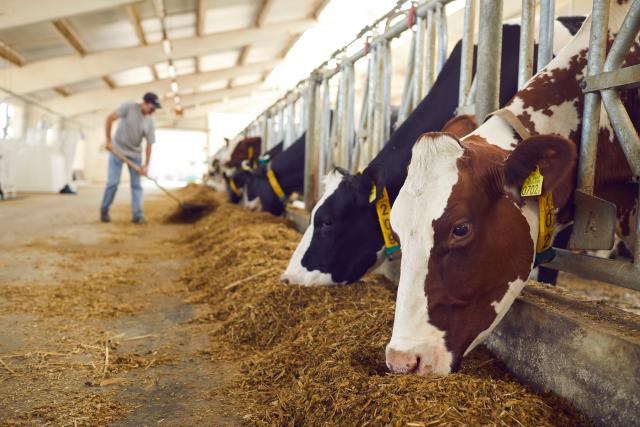

Defra announcement on the Spending Review 2025
£2.7billion per year to be invested in sustainable farming and nature recovery for 2026/27 to 2028/29
Following the Spending Review, Defra has secured a multi-year funding commitment from HM Treasury.
More than £2.7 billion will be invested in sustainable farming and nature recovery a year from 2026/27 to 2028/29.
Funding paid to farmers under the Environmental Land Management Schemes will increase by 150% from £800m in 2023/24 to £2 billion by 2028/29.
Read the full announcement on the Defra blog.
Earlier this year the Environment Agency published a video guide ‘What Should You Expect from a Farm Inspection?’ which offers useful insight into the process and how you can prepare.
For those with sheep and goats, the RPA has launched its first ‘What to expect from a sheep and goat visit' video, providing farmers with essential information about sheep and goat identification visits and how to effectively prepare for them.
The video series will form part of RPA's broader strategy to support farmers in meeting their regulatory obligations.
CSF - Helping farmers plan for Environment Agency Inspections
Catchment Sensitive Farming in the Wessex area (Dorset) hosted an event in partnership with the Environment Agency, National Farmers Union and Farming Community Network to inform farmers on ‘What to expect from an Environment Agency inspection’.
As these inspections have not been conducted in the area for several years, they worked together to deliver a presentation and farm walk with advice and support.
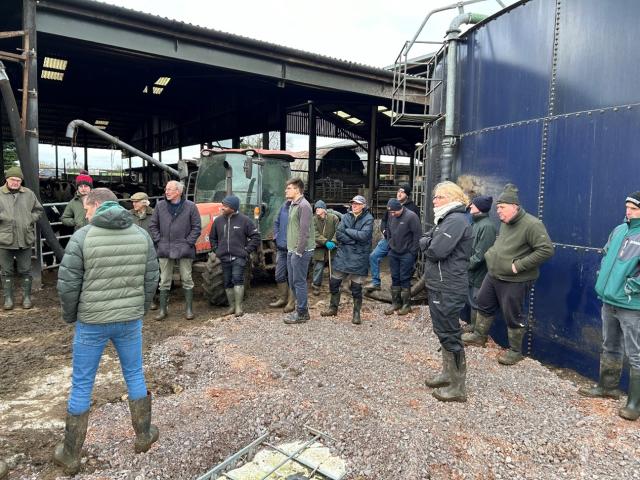
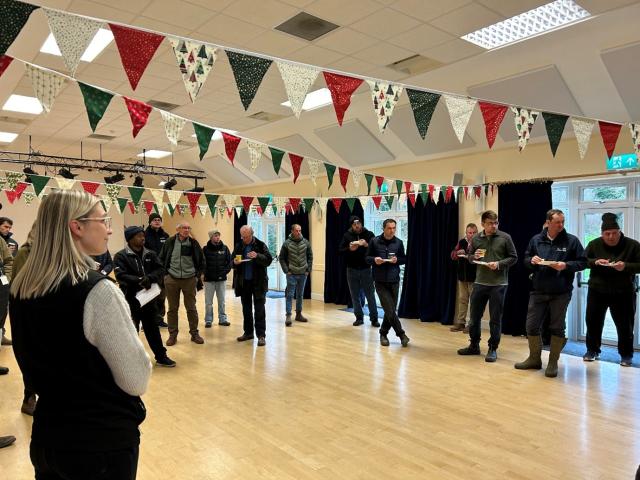
Actions highlighted to prepare for an inspection:
- Knowing your slurry storage capacity. The most common way is by using the AHDB’s latest free Slurry Wizard tool. Slurry wizard | AHDB (updated April 2025)*.
- Clearing silage clamp perimeter drains and making sure drains and any potential effluent from the front of the clamp flows towards an effluent tank or slurry store.
- Having soil testing results and spreading records available for fields where manures or fertilisers are applied to show compliance with the farming rules for water
- Having records available if the farm is in a Nitrate Vulnerable Zone (NVZ)
*(4 months is the minimum requirement for slurry storage, for NVZs 5 months for cattle slurry and 6 months for pig slurry is required. A goal of 6 months storage is recommended to avoid exceeding crop requirement when spreading – see the Farming Rules for Water).
Catchment Sensitive Farming can offer advice to farms ahead of Environment Agency Inspections and advise on longer-term farm planning such as reducing slurry volumes or increasing slurry storage capacity and growing crops in ways that minimises soil erosion and nutrient loss.
To contact your local CSF team visit farmingadviceservice.org.uk/csf/get-in-touch.
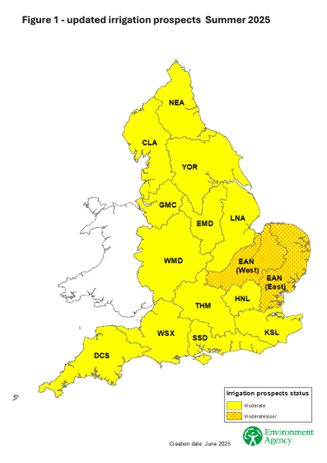
The EA’s updated prospects for irrigation across England for the Summer 2025 season is Moderate. The continued dry spring and start to the summer has contributed to a further downgrade to the irrigation prospects since the last report in April.
For the remainder of the irrigation season the EA are encouraging all irrigators to actively review their water needs and consider the range of options to help secure and increase water resilience for the summer.
More information including Area detail is available at updated irrigation forecast for summer 2025.
Environment Agency guidance published on how drought is managed in England
The Environment Agency has published guidance on how they manage drought across England. The policy paper summarises key actions taken during dry weather, with sections relevant to agriculture including:
2.5 Agriculture and horticulture mitigations
2.6 Private water supply mitigations
5. How we communicate with others
The “National Framework for Water Resources 2025: water for growth, nature and a resilient future” was published on 17 June.
This framework explores England’s long term water needs, setting out the scale of action needed to ensure resilient supplies and an improved water environment. Further detailed analysis in next month’s newsletter.
CSF Case Study: Practices to protect soil and water quality in Kent mixed farm
Mixed arable and beef farm in Kent enhance farm practices to protect soil and water quality through work with the EA and CSF.
During a routine farm inspection, the Environment Agency (EA) identified two compliance issues at a Kent arable and beef unit farm. The first involved silage stored within 10 meters of a watercourse, and the second concerned mobile chemical storage practices that posed a high risk and potential for significant damage to the environment.

The EA officer explained the potential risks associated with these practices to the farmer, ensuring they had a thorough understanding of the situation. Once the farmer grasped the implications, collaborative discussions took place between the farm, the EA, and their Catchment Sensitive Farming (CSF) adviser to identify solutions.
The farmer then decided to change his silage storage and management practices. A brand new fully covered SSAFO compliant clamp was constructed and will be ready for this year's silage making. The opportunity is now there to have more consistent silage and reduce the need to collect, store and handle rainwater.
Regarding the chemical storage, the existing mobile facility was deemed unsuitable due to the risk of containers falling whilst travelling on the road or across rough farm tracks and fields. Make up was in uncontrolled areas often close to a watercourse. To address this, the farm installed a purpose-built make-up area in the yard. This newly contained covered area was adjacent to a new chemical store, draining to a bespoke biofilter, providing a safe and compliant solution, effectively mitigating the risks of chemical spills and providing a suitable wash down area.
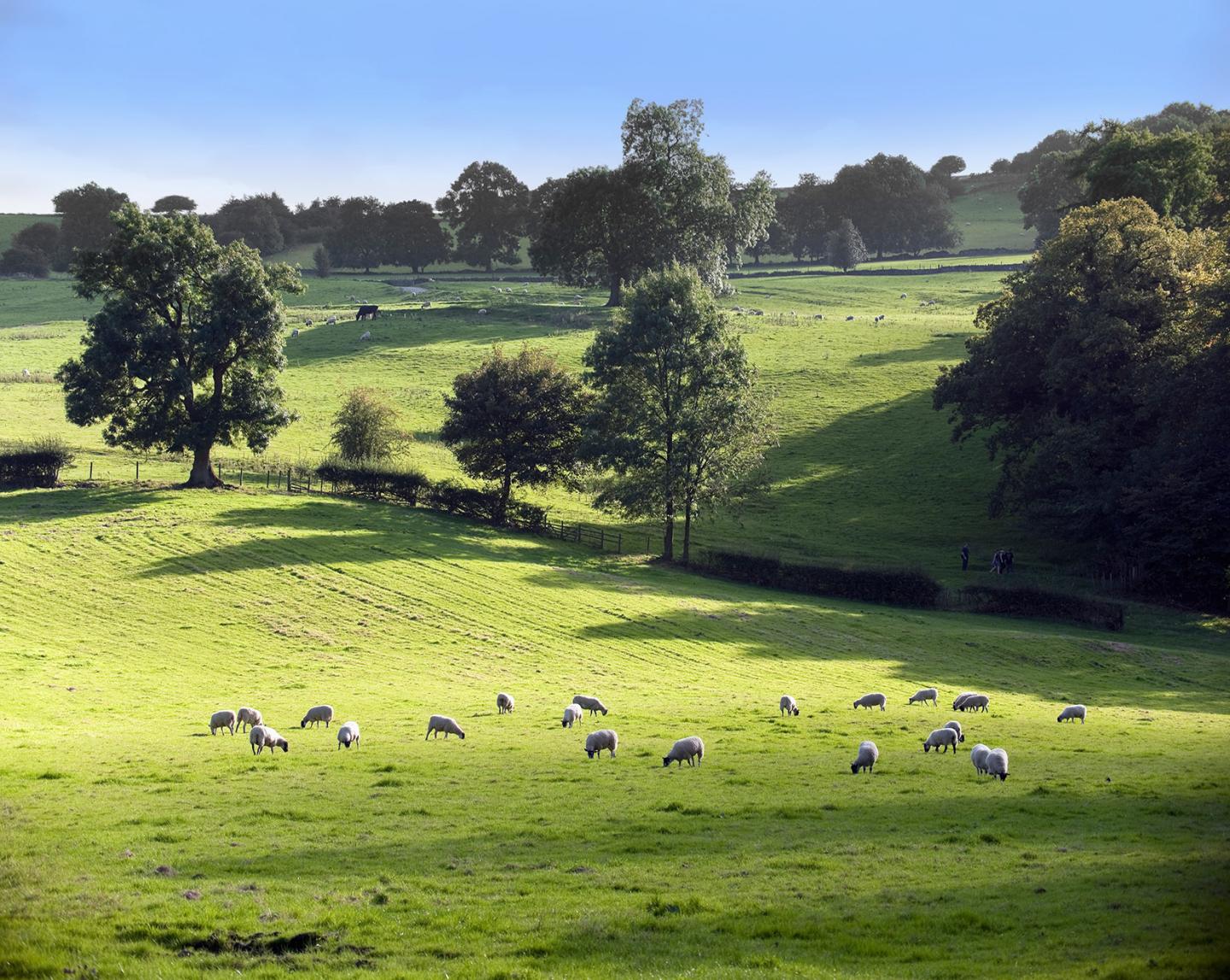
Telfit Farm - a practical example of agroforestry in hedgerow that boosts productivity and biodiversity
Located in the Yorkshire Dales, the 650-acre Telfit Farm is run by the Leatham family, who have embraced regenerative farming since 2016. Their livestock – Belted Galloway cattle, Middle White pigs, and Herdwick sheep – now benefit from a landscape designed to work with nature, not against it.
With support from the White Rose Forest and Defra’s Nature for Climate Fund, the farm has launched an ambitious agroforestry initiative this season. The project includes the planting of over 40,000 trees, creation of seven hectares of riparian woodland, and introduction of 20 hectares of wood pasture. A key feature is 3.5 km of new native hedgerows, which divide 34 hectares into paddocks for mob grazing – a technique known to boost soil fertility, enhance biodiversity, and support healthier livestock.
The transformation doesn’t stop at hedgerows. The farm is also restoring habitats through the creation of wildlife ponds, herbal leys, wildflower meadows, and a traditional orchard of 325 apple trees. These efforts not only enhance the natural environment but also improve the farm’s capacity to hold water – by up to 20,000 litres per acre for every 1% increase in soil carbon.
Funding from the White Rose Forest has covered the majority of the project’s infrastructure and planting costs, including 10,000 metres of fencing and gates. Tree and hedgerow species were carefully selected to match ecological goals and site conditions, with a focus on boosting mineral diversity in forage to support animal nutrition. The ultimate goal is to remove the need for imported feed and supplements, improve animal health, and increase profitability.
Interested in agroforestry support?
If you live in North and West Yorkshire, visit the White Rose Forest website to learn more.
If you live elsewhere, click here to find the right support for you.
The Management of Hedgerows - Regulations 2024: One year on
It has been one year since the introduction of new Hedgerow Management Regulations.
In this video RPA Field Officer Peter Clampett talks about the regulations and why they were introduced, which hedgerows the rules apply to, the buffer strip rules and exemptions to the regulations.
A reminder of the rules:
- To protect active bird nests during this time, there is a hedgerow cutting and trimming ban from 1 March to 31 August (inclusive)
- To prevent harm to the structure and health of the hedgerow, the regulations require a 2-metre buffer strip, measured from the centre of a hedgerow, where a green cover must be established and maintained
- No cultivation or use of pesticides or fertiliser on land within 2 metres of the centre of a hedgerow
Exemptions
There are a number of situations under which you are excepted from the rules, and you do not need to notify the RPA to ask for the exemptions.
These are detailed at gov.uk/guidance/hedgerow-management-rules-cutting-and-trimming#exemptions-from-the-rules
You must keep a record of all works that you carry out under an exemption. If you are visited by the RPA you must be able to prove how and why you relied on the exemption.
Exemptions when sowing oilseed rape or temporary grass in August
You need to notify the RPA each year before you can cut or trim a hedgerow in August to sow oilseed rape or temporary grassland during the same August.
However, you do not need to wait for written permission before carrying out any work. As long as you meet the rules of the provision, you only need to make sure your notification is received by the RPA
Details can be found at gov.uk/guidance/hedgerow-management-rules-cutting-and-trimming#exemptions-when-sowing-oilseed-rape-or-temporary-grass-in-august
The RPA have put together an explorative blog about what has happened since the introduction of new regulations in 2024, including answers to frequently asked questions, information on derogations and the involvement of Local Authorities.
Derogations
You can apply to RPA for written permission (a derogation) to be exempt from the rules for any of the following reasons:
- it would enhance the environment
- it is necessary in relation to livestock or crop production
- it would improve public or agricultural access
Before applying for any derogation, consider the impact it may have on any agri-environment agreements you have.
How to apply for written permission (a derogation)
To apply for a derogation, you must email or write to the RPA.
You should:
- send all the available evidence (for example, photographs or diagrams)
- explain what you want to do
- include the land parcel numbers you want the derogation for
- use the subject heading ‘Hedgerow management rules derogation’
You must wait for the RPA to consider your request and grant any successful derogation in writing before carrying out any work.
From summer 2026, Defra will introduce changes to cattle identification, registration and reporting that will improve the government’s ability to respond effectively to disease.
Electronic ID (EID) will become mandatory for all new-born calves from 2027, using low frequency (LF) technology. The new system will allow animals with EID ear tags to be scanned when moved, replacing the current visual reading and manual input of the tag number. This electronic traceability will significantly strengthen the UK's ability to prevent, detect and respond to animal disease outbreaks, protecting farmers and the rural economy.
This will be supported by a new cattle movement reporting system which will be easier to use for farmers, markets, abattoirs and regulators alike. This will simplify existing regulations and support the livestock industry to boost productivity, food security and international trade. The reforms follow the UK Government's Cattle Identification Consultation 2023, which showed strong industry support for these measures. View the summary of responses and government response on GOV.UK.
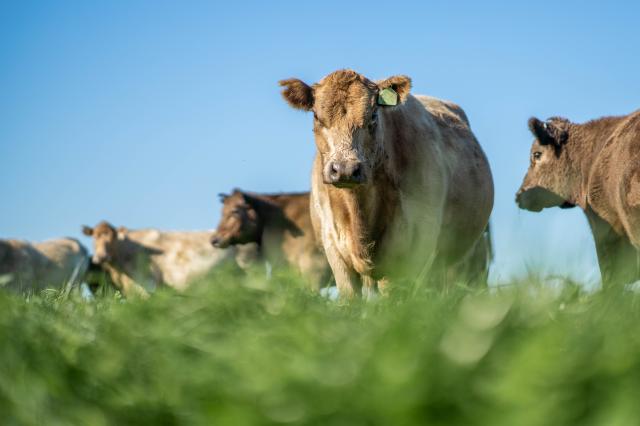
This announcement comes alongside other significant investments in animal health, including:
- £200 million for the UK's main research and laboratory testing facilities at Weybridge
- Free annual vet visits for livestock farmers in England to check for diseases and receive biosecurity recommendations

Defra regularly updates the Farming blog. Please subscribe to the blog to ensure you receive all the latest news.
Farming Equipment and Technology Fund now open for applications
Farmers are now able to apply for grants worth up to £25,000 each to invest in machinery that boosts farm productivity.
Applications for the Farming Equipment and Technology Fund (FETF) opened on 29 May and will close in 6 weeks at midday on 10 July. Grants are available for boosting productivity, managing slurry or improving animal health and welfare.
From seed-planting robots that reduce labour costs, to slurry separator systems that bring down reliance on expensive fertilisers, this new round of the popular FETF will make £46.7m available to boost profitability by helping farmers cut costs while increasing efficiency.
£5m competition opens to bring innovative agricultural ideas to market
The new £5 million round of the Investor Partnerships competition opened for applications on 2 June, blending government grant funding with private investment to help agri-tech businesses bring innovative agricultural ideas to market and onto farms. The competition closes 2 July.
Find out more on the Defra Farming blog post.
Farmers to get fairer deals for combinable crops
Arable farmers will benefit from a new government review tackling unfair practices in the combinable crops supply chain, helping to protect their business and income from unfair practices.
Announced on 5 June, as part of the government’s New Deal for Farmers, the review is a major step towards ensuring producers have clear, fair, and enforceable contracts – covering pricing, supply volumes, data, and dispute resolution. It will back British farmers to get a fairer return for the food they produce.
A public consultation will be launched, giving farmers and stakeholders the chance to share their experiences. This will ensure we have a clear picture of how the supply chain works.
If the consultation shows that legislation is needed, we’ll work with industry to develop them, with more opportunities for input to make sure the rules are practical, fair, and fit for purpose.
Other sectors:
This review of the combinable crops sector builds on the approach taken in the Fair Dealing (Milk) Regulations, which came into law on 9 July 2024. All existing milk contracts must be updated to meet the new standards by 9 July this year.
New regulations came into force in May that will give pig farmers greater certainty over the terms of their contracts. The regulations aim to make the pig sector more profitable by improving how contracts work, protecting producers from unfair practices and giving farmers more control over how they sell their pigs.
The government is still working to introduce similar, tailored, legislation for the egg and fresh produce sectors. Proposals for regulations in both sectors have been shared with stakeholders and are available for anyone that wants to engage in the development of these regulations.
£13.6 Million Boost to Tackle Food Surplus and Support Vulnerable Communities
Grants totalling £13.6 million have been offered to 12 food charities across England – including City Harvest, Food in the Community CIC and FareShare.
The Tackling Food Surplus at the Farm Gate grant scheme, part of the government's Plan for Change, will help these organisations collect and distribute an estimated 19,000 tonnes of surplus food from farms directly to community kitchens, food banks, shelters and cookery projects.
For more information on the grant, please visit GOV.UK.
Bluetongue virus restricted zone to be extended to all of England on 1 July 2025
From 1 July 2025, the Bluetongue serotype 3 Virus (BTV-3) restricted zone will extend to cover all of England, effectively ending movement restrictions and allowing farmers to move cattle, sheep, all ruminants and camelids throughout England without movement tests. This decision follows consultation between industry and scientists, recognising that the disease-affected area is now too extensive for movement restrictions to remain effective.
All farmers and keepers are encouraged to discuss the use of BTV-3 vaccines for their animals with their private vet as this is the most effective way of protecting susceptible species. Restrictions on the freezing of germinal products within the restricted zone will remain.
If you keep animals in England and routinely move animals into Wales or Scotland you need to check for updates online at GOV.WALES and GOV.SCOT on what licences you will need and whether or not you will need to organise and pay for a pre-movement test.
Bluetongue is a notifiable disease. Farmers should continue to monitor their animals frequently for clinical signs and report suspicion of disease immediately to APHA.
APHA has published guidance for livestock owners on how to spot and report the disease.
Apply now for funding to tackle on-farm drought risk
The Environment Agency have launched applications for a new round of fully funded, expert-led studies to assess and plan for more secure and reliable water supplies on farm.
The £1.1 million package will support 12 fresh screening studies across England, known as Local Resource Options (LROs), supporting farmer groups to collaborate on drought resilience measures and delivering on the government’s commitment to food security.
With dry weather and increasing pressure on irrigation, these studies will assess the strengths and weaknesses of different water management options such as multi-farm reservoirs, treated wastewater recycling systems, or collaborative irrigation networks.
Last year, the fund provided 106 farms with recommendations and attracted positive responses from farmer groups for helping identify risks and facilitate greater co-operation between neighbours.
Proposals included building rainwater storage and distribution systems for growers of soft fruits like strawberries, wetlands to recycle wastewater otherwise for potato farmers or shared reservoir and irrigation networks to supply crops and aid peat restoration.
You can access everything you need to apply on GOV.UK.
In the first round, one group in the Nar Catchment, East Anglia, used their screening study to evaluate four options to improve long-term water security, ranging from managed aquifer recharge to formal water-sharing agreements. These options were reviewed for feasibility, cost, and environmental alignment. The farms involved were already facing increasing risk from potential licence changes and declining summer flows and used the study to explore collaborative approaches that complement wider catchment initiatives like Landscape Recovery.
Looking for some inspiration? Learn more and read case studies from the first round on the Environment Agency Water Hub.
TIAH Research shows upskilling will be crucial to sector success
The Institute for Agriculture and Horticulture (TIAH) has published a landmark review, conducted in partnership with the University of Warwick, highlighting how rapid technological change and ongoing labour challenges are reshaping the future of the UK’s agriculture and horticulture sectors.
The research, now available on the TIAH website, provides compelling evidence that upskilling the workforce is essential for the sector’s continued success and resilience. As automation and digitalisation accelerate, the nature of jobs is evolving, shifting demand towards higher-skilled, specialist roles and reducing reliance on low-skilled and seasonal labour.
Rural Payments Agency Blog
To stay up to date with the latest information and updates from the Rural Payments Agency (RPA), sign up to the RPA Blog. You can also listen to the RPA Podcast, which has been launched to help farmers, landowners and rural communities keep up to date with the latest news from the RPA. You can also follow the RPA on social media:
- X @ruralpay
- Facebook: facebook.com/RuralPaymentsAgency
- YouTube: Rural Payments Agency
- Instagram: ruralpay.

Stay up to date with us
Subscribe to our free monthly newsletter
If you don’t already receive our monthly FAS newsletter, please visit farmingadviceservice.org.uk/signup and enter your email address into the newsletter sign-up box.
In line with data protection regulations, such as the General Data Protection Regulation (GDPR) and the UK Data Protection Act 2018, the FAS has updated its privacy policy to explain how your data is kept safe. To view the policy, please visit www.farmingadviceservice.org.uk/events/privacy/.